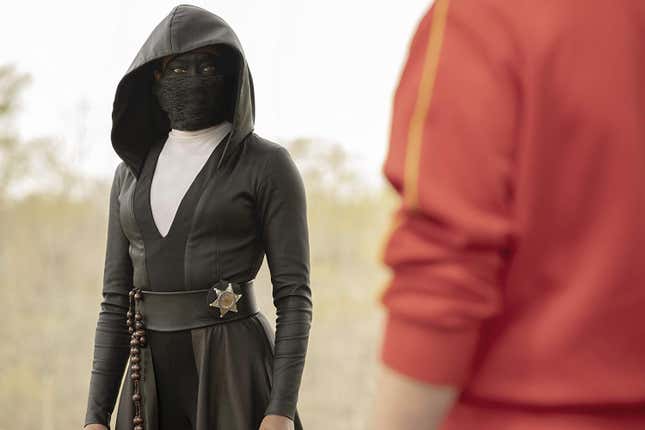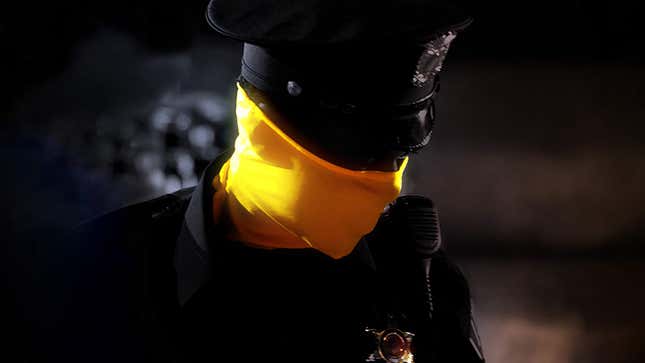
Like the graphic novel did over 30 years ago, HBO’s adaptation of Watchmen immediately surprises viewers with one of the most arresting takes on a comic book in years. As fans of good television and good comic books, Kotaku’s Michael Fahey, Gita Jackson, and Joshua Rivera gathered around the digital water cooler to talk about this new rendition of the world envisioned in Alan Moore and Dave Gibbons’ seminal comic.

Joshua Rivera: HBO’s take on Watchmen is a sequel that doesn’t assume you’ve read the comic or seen the film; instead it tells a story about an alternate 2019 that’s different in ways that spin out of what happened in Alan Moore and Dave Gibbons’ graphic novel. Like that comic, the show has a surprise in store for people expecting something superhero-y. A big one: the prologue is set during the Tulsa, Oklahoma race riot in 1921. How did you all feel with the show throwing all that at us right out of the gate?
Gita Jackson: When I finished the episode, I collapsed into uncontrollable laughter at trying to parse what it would be like to being a normal human being in that world. That said, I think I liked it?
Michael Fahey: I started up the episode with absolutely no foreknowledge. I had read nothing. I had seen nothing but the early teaser trailers. I kinda sat and stared through the first 20 minutes or so. My wife, who had read ahead, laughed at me.
It was a place I did not expect a comic book-inspired piece of entertainment, even one as dark as Watchmen, to go. I liken it to the first X-Men movie opening in a concentration camp.
Joshua: That’s a great comparison! I was pretty gutted and immediately felt awful—like Gita says, this seems like an incredibly grim world to just exist in. But I also could not look away. It worked for me.
Are either of you Watchmen fans? I’m a little hazy on the book, but know most of the important stuff.
Gita: I read Watchmen at age like, 13, and it really informed a lot of my later tastes in comics. One thing I will say in this show’s favor, is that it’s finally a piece of superhero media that manages to be as fucking weird as the comics are.
Fahey: I collected the comics when they first came out, left my carded and bagged set at a roommate’s place I had to bolt from in 2001. Still own the trade, hated the squid-less ending of the movie. I LOVED the squid rain. Such a weird scene, sirens go off, little squidlets fall from the sky, but immediately I know as a comic fan that this is the world I remember, just several decades later.
Joshua: Yeah! It’s extremely clever in how it nods to anyone who read the comics. The squid rain is VERY good.
Gita: Yes! It does truly, and meaningfully, build on the result of the ending of the comics. I feel like I’m only at the hysterical laughter place because there is so much that is yet to be explained.
Fahey: As an aside, if you want weird-as-comics, Gita, watch Doom Patrol.
Gita: You keep telling me to watch it, and I will finally relent.
Joshua: Also, as an aside, I am vehemently nodding.
Gita: Bless you both. But also: Robert Redford has been president for THIRTY YEARS???
Joshua: Hahaha yes! I think this follows Nixon’s 16-or-so year term that was happening during the comics.
Fahey: Yeah, there is a scene in the show where the girl recites the presidents and it was something, Nixon, Redford.
Joshua: And that Vietnam is the 51st state! Something I thought they made up in the show, but nope—it’s in a corner of the first issue! (I have been reading A LOT since last night.)
Fahey: Ah, it’s President Eisenhower, President Nixon, President Ford, President Redford. I wonder how long Ford made it.
Either way, this world is pretty fucking grim.
Joshua: Extremely grim! And it’s leaning into the grimmest parts of the real world, going extremely topical with a fictional white supremacist group that has taken to wearing Rorschach masks, and a masked police force (cops wear masks now. It’s weird) trying to bring them down. It’s all incredibly well done, but incredibly hard to watch, and you’d be justified for being skeptical over how it’s all going to play out. What stood out most to you two?
Gita: I just have to wonder if any crimes are committed that are not a result of white supremacy.
Fahey: It was hard not to constantly think about those masks. The yellow ones worn by patrolmen, the fancy reflective one worn by the interrogator, Looking Glass, and of course Sister Midnight’s outstanding hood, mask, and makeup combo. This is a world where masked vigilantes are outlawed, but now the police wear masks for the very same reasons.
I want a game journalist mask.
Gita: In this show, the police in Tulsa are masked as a reaction to a previous “war” with the white supremacist, Rorschach-inspired Seventh Kavalry. You don’t see them do anything but deal with the Kavalry. I’m not sure it’s even necessary for the show to get into, but you have to wonder how people respond to a noise complaint violation being dealt with by a person in a mask.
Fahey: They do seem to be of singular purpose. I want to see Sister Midnight deal with kids shooting off firecrackers. Would they be racially charged firecrackers?
Joshua: Yeah, I like how uncomfortable I am seeing literally any mask in this show. Which is extremely Watchmen—taking iconography you like, tilting it sideways, and making you very uncomfortable with how it plays out.
Fahey: I got very uneasy during the traffic stop towards the beginning. It’s very much a scenario that feels like an extension of the real world. A patrolman stops someone, suspects they might be violent, and has to call in to have his gun unlocked. The mechanism jams, and the patrolman gets shot up. I mean, fucking hell, guys.
Sorry to cuss so much, but that’s what I did throughout the episode. When I wasn’t going, “Oh Trent, your music is so dramatic.”
Gita: Listening to Trent doing dance music again made me want to hit up the goth club.
Fahey: I felt young and dangerous.
Joshua: The score rules so much. I love a good goth groove.
Gita: But Fahey, I’m with you, though I couldn’t help but read it through the lens of race. We hear a lot about those kinds of patrol stops in the real world, but with the races reversed. So much of this first episode is centered around race—we open with the death of Black Wall Street, then that traffic stop with the black cop and white driver, and then lead right into a child saying something racist to woman of color. Sometimes it felt like the show was doing a lot of work to make me root for a cop.
I am more than happy to root for Sister Night, but also, uuhhhhhhhh...
Fahey: For all the cops! This is a very pro-cops show so far. Of course, it’s only the first episode, and if I know anything about Watchmen, shit is going to change. But most of this episode is a revenge arc, cops getting back at the white supremacists for taking down one of their own, then celebrating with a dinner party.
Joshua: Right! Do you guys suspect that Sister Night will slowly start to uncover something amiss with the police? Everything’s unsettling about this show, but the scenes in the precinct all feel...bad. Ominous. I think something’s up!
(I mean, the obvious thing folks bring up in criticism of this show is that we have news reports about how some cops are white supremacists, and I feel like if the show isn’t aware of this....that’s incredibly tone deaf.)

Fahey: I dunno, Chief Judd, played by Don Johnson, felt a little bit off himself, didn’t he? Good old boy, little bit of a cokehead. Felt a little greasy. Considering the way the episode ends...
Gita: Yeah, it does seem like we’re about to uncover something unsavory about the police. And at the very least, I trust Lindelof to push the narrative as far as he can.
Joshua: Same!
So, before we wrap up, I want to ask you guys about my favorite totally off-kilter touch (and hear if you have any we haven’t talked about yet): Jeremy Irons in the castle.
Fahey: “Oh boy, it’s Jeremy Irons! Eat that scenery, Jeremy, nom nom nom,” is exactly what I said when he came on the screen.
Joshua: Genuinely laughed out loud when you said that, Fahey.
Gita: “That is a horseshoe.”
Fahey: He’s been my hero since the Dungeons & Dragons movie.
Gita: I just love the fact that acclaimed actor Jeremy Irons will clearly do... anything. Looking forward to whatever nonsense he gets up to in this show.
Fahey: He’s Ozymandias here, though, right?
Joshua: Right!
Fahey: I bet his servants are robots.
Gita: Oh they’ve gotta be.
Fahey: And whatever he gets up to, he did it two episodes ago.
Joshua: There’s a newspaper headline you can peep for a second that says he’s dead, but if you look online, HBO has ancillary articles you can read where it’s clear no one found a body, he’s just been missing seven years. So there’s something weird going on there.
Fahey: He was a bright spot in a grim tale, I will say. I agree with what Gita has been saying. They’re painting a very interesting world and I wish I could see what was going on around the periphery.
I hope I don’t come away at the end of the series wishing they’d told some other story in this disturbing setting. Like, what’s home life like for the white kid who asked about reparations in the classroom?
Joshua: Oh man what did he call them? Redfordations?
Like “Obamacare.”
Fahey: YES!
Joshua: Extremely smart! Taking a social program meant to help those in need and turning it into a derogatory term.
It’s amazing how close to home this stuff all hits and yet I’m still entertained? But like you Fahey, I want this to feel worth it, you know? Not grim for grim’s sake, which is the wrong lesson everyone learned from Watchmen the first time around.
Fahey: Oh man, that post-Watchmen dark and gritty phase was BRUTAL.
I just hope that when all is said and done, the true Watchmen were inside us all along.